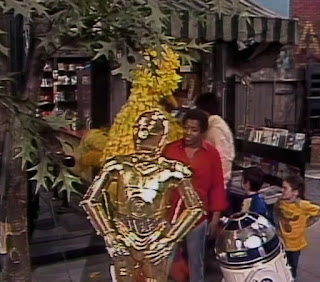Northern Calloway, the actor who played David, had created a character called The Skyrider that he wanted to create an animated movie around. When Marvel began working on it, Calloway sued for copyright infringement. Except that Calloway had sold the rights to a company called LMN Productions who, in turn, transferred them to Marvel. Calloway's lawyers said the documents were forgeries with no evidence to that claim, and Calloway's lawyer ultimately took the brunt of the court ruling, being personally fined $50,000 basically for wasting everybody's time.
Here's how it was written up in the April 1990 issue of Entertainment Law Reporter...
United States Supreme Court upholds sanctions against individual lawyer, but not law firm, for filing meritless claims against Marvel EntertainmentI can't find any details about The Skyrider project itself, much less any concept designs or drawings of what the project might have entailed. It doesn't appear that Marvel ultimately did anything with it. I suspect this was due to the fact that it was tied up in litigation for the better part of a decade and, ultimately, everyone at Marvel who might've been interested in back in 1982 when Calloway first filed suit had either gone on to other projects and/or left the company entirely by 1990 when this was finally wrapped up. (Calloway himself passed away in January of that year.) As near as I can tell, though, Marvel still owns the rights to The Skyrider if they wanted to pursue it again in any capacity.
The United States Supreme Court has ruled that the sanctions available under Rule 11 of the Federal Rules of Civil Procedure may be imposed against individual lawyers only, not their firms.
The issue arose, as reported at ELR 10:10:19, in a proceeding brought in 1982 by actor Northern Calloway. Calloway, best known for his role as "David" in the television program "Sesame Street," claimed that Marvel Entertainment Group infringed his copyrighted script for a proposed animated science fiction movie entitled "The Skyrider." Marvel presented contracts indicating that Calloway had sold his rights in "The Skyrider" to LMN Productions, and that LMN had transferred those rights to the Marvel parties.
A Federal District Court dismissed Calloway's complaint (with leave to refile) on the ground that the complaint did not specify the registration number of his copyright and the dates upon which the alleged acts of infringement occurred.
An amended complaint, signed by Calloway's lawyer, Ray L. LeFlore, was filed. The amended complaint remedied the defects cited by the court and also asserted that Calloway's signatures on the option documents were forged.
In 1984, LeFlore joined with Radovan Pavelic to form the law partnership of Pavelic & LeFlore; court papers in the case subsequently were signed "Pavelic & LeFLore By /s/ Ray L. LeFlore (A Member of the Firm) Attorneys for Plaintiff."
The District Court directed a verdict in favor of Marvel on the allegation of forgery. After a six week trial, a jury, notwithstanding Calloway's arguments challenging the validity of the contracts, returned a verdict in favor of Marvel.
The court, stating that the forgery claim had no basis in fact, and was not investigated sufficiently by the lawyers, imposed Rule 11 sanctions in the amount of $50,000 on the law firm of Pavelic & LeFlore, and $50,000 on Ray L. LeFlore.
A Federal Court of Appeals upheld the imposition of sanctions against the law firm and against LeFlore, but, on the court's own motion, reinstated Calloway's appeal of a separate judgment imposing sanctions of $100,000 against the actor.
The United States Supreme Court has reversed the Court of Appeals' decision with respect to the $50,000 in sanctions imposed against the law firm of Pavelic & LeFlore on the ground that Rule 11 provides that when a paper is signed in violation of the Rule, a court may "impose upon the person who signed it ... an appropriate sanction." Justice Antonin Scalia noted that the Rule "strikingly" departs from normal common-law assumptions such as that of delegability - the signing attorney represents that the filed paper is factually and legally responsible, and that "he personally has applied his own judgment. Where the text establishes a duty that cannot be delegated, one may reasonably expect it to authorize punishment only of the party upon whom the duty is placed."
The Court of Appeals judgment therefore was reversed insofar as it allowed Rule 11 sanctions to be imposed against Pavelic & LeFlore, and the case was remanded for further proceedings.
Justice Marshall, in dissent, viewed the court's interpretation of Rule 11 as overly restrictive in reading into the Rule "an absolute immunity for law firms from any sanction for their misconduct." The court's decision would result in an "unnecessary erosion of the discretion of federal judges," stated Justice Marshall, for the Rule could be read as allowing a court to impose sanctions on any juridical person, including the law firm of the individual signer. Justice Marshall concluded by emphasizing that the decision "unwisely ties the hands of trial judges who must deal frequently and immediately with Rule 11 violations and ill serves the goal of administering that Rule justly and efficiently."







0 comments:
Post a Comment